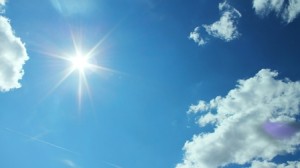Heat Exhaustion, Heat Stroke & Sunstroke
 Heat exhaustion happens when the body’s cooling system stops working. The next stage after heat exhaustion is heat stroke caused by strenuous exercise or activities outside during the warm summer months or sun stroke, where the sun is the heat source.
Heat exhaustion happens when the body’s cooling system stops working. The next stage after heat exhaustion is heat stroke caused by strenuous exercise or activities outside during the warm summer months or sun stroke, where the sun is the heat source.
All three conditions are serious health issues and in severe cases, can cause organ dysfunction, brain damage, and death.
It’s important to get out of the sun and stay somewhere cool if you think you might be starting to feel the effects of heat exhaustion. This includes feeling lightheaded, dizzy, nauseous, or “headachy”. If you are experiencing any of these symptoms, drink water, and try to cool yourself down as quickly as possible: go inside an air conditioned building, cool off in a sprinkler or pool, wet your head with water, or at the very least find some shade.
Heatstroke occurs when your body is no longer able to keep your body cool. Your body relies on water evaporation to stay cool, so as your temperature rises, your body reacts by sweating. Extremely warm temperatures can quickly overwhelm your body’s cooling system and when sweating can no longer keep you cool, body temperature quickly rise, causing the symptoms of heat-related illness.
Prolonged exposure to the sun contributes to sunstroke. When body fluids are not adequately replenished, sun exposure can cause rapid dehydration. Even on mild or overcast days, the sun can have negative health effects, including dehydration, sun burn, and sun allergies.
The medical definition of heat stroke is a core body temperature of 39 degrees Celsius or higher. If you’ve spent a lot of time in the sun and you’re experiencing any of the symptoms below, it’s important to seek medical attention immediately!
- Skin is hot to touch
- Extreme Fatigue
- Nausea
- Severe Headache
- Vomiting
- Rapid Heartbeat
- Blurred Vision
- Mental Confusion – if you’re having difficulty thinking or focusing
- Seizures
- Lack of Sweating
Your level of activity is one of the greatest indicators of the amount of water you should drink during hot summer weather. For an activity that takes 30 minutes or less, one to two extra glasses of water will keep you hydrated. If you are exercising, going for a long hike, playing a game of tennis, you should drink three to four extra glasses of water to keep hydrated. And, any time you exercise in extreme heat or for more than one hour, you should supplement the water with a drink that contains electrolytes.
Have fun outdoors, but be smart and plan ahead.


Leave a Reply
Want to join the discussion?Feel free to contribute!